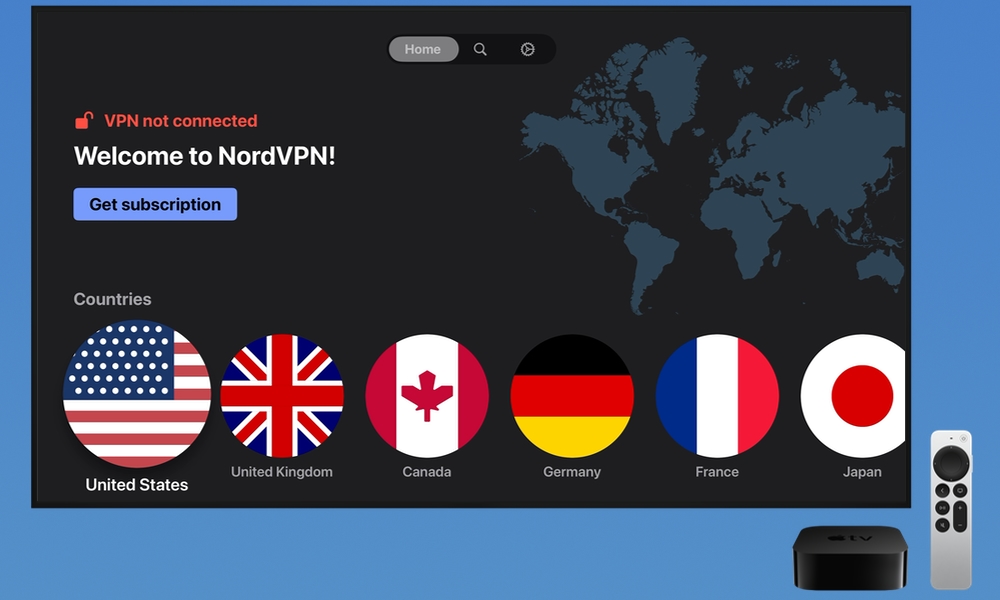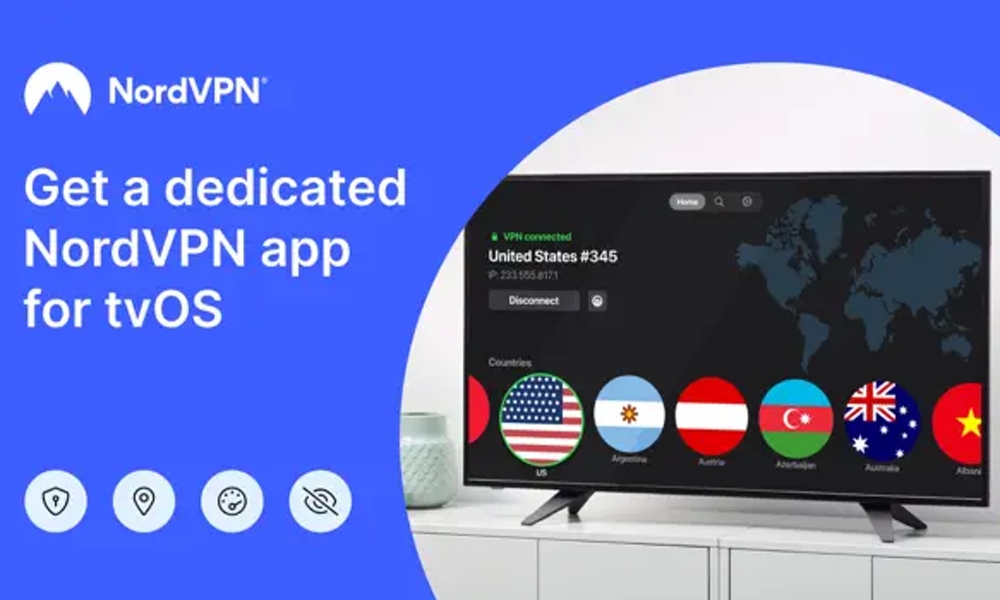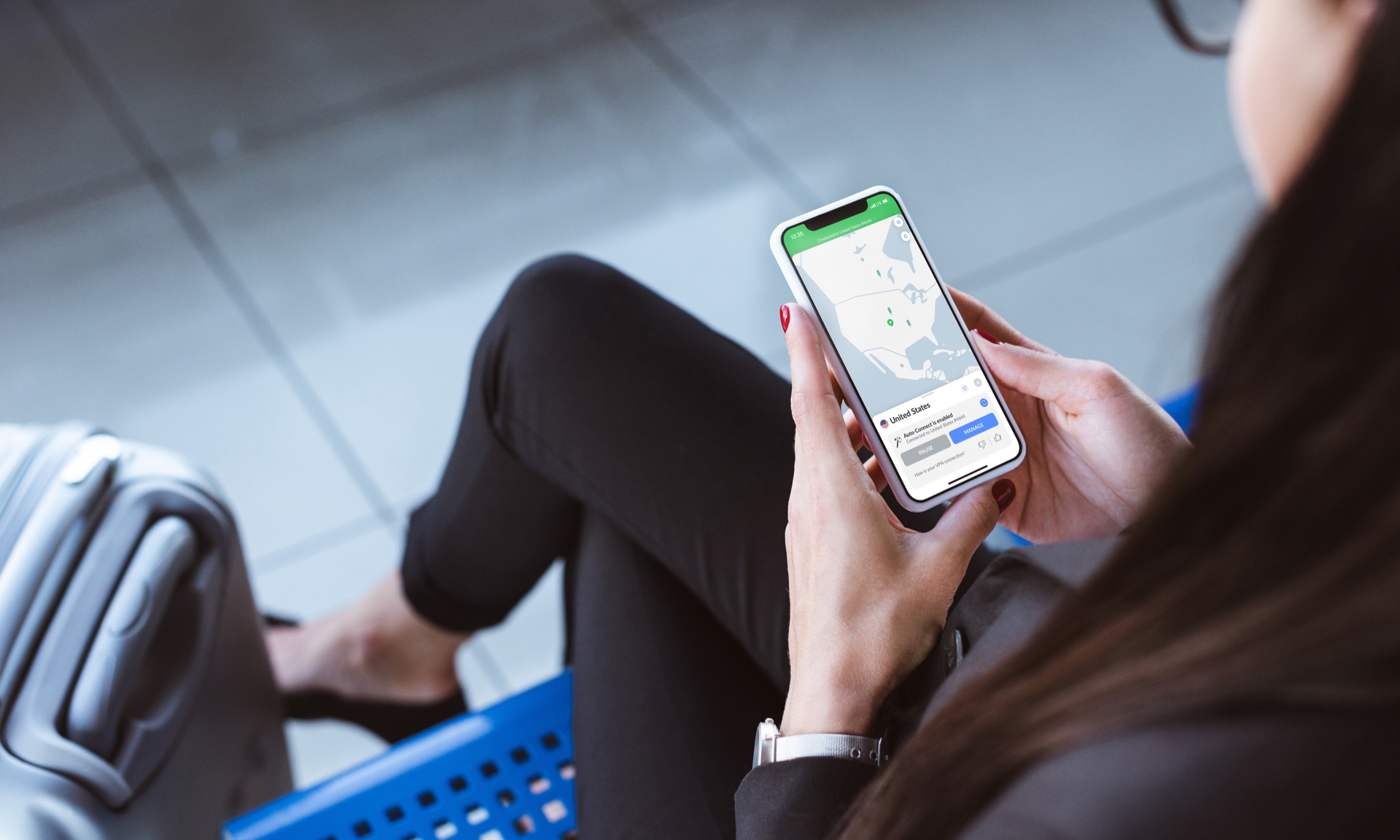NordVPN Comes to the Apple TV
 Credit: Jesse Hollington / iDrop News
Credit: Jesse Hollington / iDrop News
Toggle Dark Mode
One of the smaller but more significant features to come to the Apple TV in tvOS 17 this year was direct support for Virtual Private Networks, allowing owners of the set-top box to take advantage of VPN technology without resorting to complex workarounds like using VPN-enabled routers or complicated middleware setups on their PCs.
Thanks to tvOS 17, users can install a VPN app on their Apple TV as easily as on an iPhone or iPad — so easily, in fact, that we were left wondering what took Apple so long to bring it to the big screen. After all, iOS and iPadOS have supported VPNs for well over a decade — the technology was first introduced in “iOS” 3.0 in 2009.
Of course, there are many more reasons to use a VPN on an iPhone and iPad compared to the Apple TV. For example, remote employees may need one to get through corporate firewalls to access internal business systems, and everyone could use some extra privacy protection when surfing on public Wi-Fi networks.
On the other hand, a VPN on the Apple TV serves one primary purpose for most home users: overcoming geographic limitations on watching your favorite content from streaming services. It’s not hard to imagine Apple wasn’t in any hurry to facilitate and condone that kind of thing, and it’s still not; officially, the company says the VPN support was added for “enterprise and education users wanting to access content on their private networks, allowing Apple TV to be a great office and conference room solution in even more places.”
Nevertheless, Apple hasn’t limited the Apple TV’s VPN capabilities to only “education and enterprise” use, and a whole slew of VPN companies have quickly jumped on board.
We took a deep dive into PureVPN in October, which should give you a good idea of how most of these services will work on your Apple TV. However, more recently, some bigger players have entered the ring, including ExpressVPN and, most recently, NordVPN.
Where you Need a VPN for your Apple TV — and Where You Don’t
On the surface, NordVPN for Apple TV provides the same geolocation-overcoming capabilities as most other VPN services, doing so with the excellent performance that NordVPN is already known for. Since performance is based on the network side of the VPN, the Apple TV app should perform just as well as NordVPN’s other clients for the iPhone, iPad, and Mac.
The ability to ”spoof” your location through a VPN is inherent in how the technology works. A VPN is an encrypted “tunnel” that passes your traffic through a private network that can have an exit point anywhere in the world. Hence, when you use a VPN, other services think you’re coming from wherever that tunnel exits and have no way of knowing where you entered it.
What sets apart one VPN service from another in this area is how well its private network performs and how many exit points it has around the world. In NordVPN’s case, that’s 6,000 servers, or exit points, in 60 countries.
That higher number of servers increases the likelihood that you’ll be able to successfully bypass geographic limitations on services like Netflix, which often track down and block the IP addresses of VPN servers based on the amount of traffic coming from a single point of origin. Distributing outbound traffic across hundreds of exits in each county reduces the chances that any one of those addresses will be flagged as suspicious.
While that’s the primary reason most folks are interested in a VPN on their Apple TV, there are some privacy benefits to using a VPN. While it’s not as serious as surfing on a public Wi-Fi access point, your internet service provider (ISP) can still monitor the traffic leaving your home. Using a VPN prevents them from seeing anything other than an encrypted stream of meaningless data. Of course, they’ll know you’re using a VPN, but they’ll only see the outside of the tunnel and not what’s happening inside.
Depending on your ISP, that’s probably not a huge concern for most folks, but it’s hard to argue with an extra bit of privacy. However, there’s one other area in which installing a VPN on your Apple TV is absolutely meaningless: security from outside attacks.
Sadly, this is one area in which some VPN providers use heavy-handed marketing tactics to make people believe a VPN will make their home devices more secure. Not only is this untrue, but using a VPN from a sketchy provider could actually open you up to attacks.
To be clear, NordVPN is very much a trusted and reliable VPN company in its technical business practices. However, as Phil Nickinson points out over at Digital Trends, NordVPN has been using some disingenuous “scare tactics” in its messaging, potentially misleading folks to believe that their Apple TV is inherently insecure and that installing NordVPN will protect it from “cybercriminals.”
“Safeguard your Apple TV: A smart TV can be hacked, like any other device connected to the internet. A VPN hides your IP address and routes your online traffic through a VPN server, protecting your online traffic from potential exploits.” (NordVPN)
A VPN is not a firewall. In some ways, it’s the opposite. The VPN tunnel we described goes both ways, which means that as soon as you connect one of your devices to a VPN provider, you’re opening a gateway from their network right back into yours. This is why it’s crucial to use a trusted and reputable VPN provider rather than a small fly-by-night operation.
This is almost a non-issue for something like an Apple TV, which doesn’t operate as a server of any kind and doesn’t have much to offer hackers — barring any exploitable security vulnerabilities in tvOS, there’s not much hackers can do to (or with) an Apple TV.
However, the flip side is that your Apple TV is no less secure without a VPN. You do not need a VPN to secure your Apple TV against outside hackers.
The security features of a VPN are about privacy — protecting your data from hackers while it’s in transit on the internet; they do nothing at all to protect the data that’s at rest on your iPhone, iPad, Mac, PC, or any other devices in your home.
Protecting devices and data in your home is what firewalls and home routers are for, but again, remember that a VPN bypasses those whenever it’s connected. Even parental filtering controls on a router won’t work if your kids use a VPN, as your home router can’t see the traffic leaving their devices any more than your ISP can.
Also, keep in mind that while a VPN will hide your traffic from your ISP and obscure your original IP address from any services you connect to, the VPN provider knows where you’re coming from and can see everything that goes on inside the tunnel. As Nickinson says, “you’re really trading one master for another,” hiding your traffic from your ISP while giving VPN providers carte blanche access to your surfing habits.
It’s a good time to remind everyone that a VPN isn’t magic that makes you disappear from the internet. It’s a tunnel. And you need to be able to trust who controls the tunnel, because that’s where all your network information is now flowing.Phil Nickinson, Digital Trends
This was what got Facebook’s invasive “Onavo Protect” VPN in trouble — it was hoovering up a ton of user data under the guise of “protecting” them from “potentially harmful sites.”
Thankfully, this is far less insidious than it sounds on the surface. The most important stuff we do on the internet is encrypted at the application level before it leaves your computer. Since most websites use HTTPS, neither your ISP nor a VPN provider will be able to monitor your Gmail traffic, online banking, Amazon shopping, or most other things you do on the web. However, they can usually track where you’re going and how much time you’re spending in those places, and they can also probably figure out what you’re watching on Netflix.
So, using a VPN on your Apple TV is still a good way to keep your ISP from monitoring your viewing habits, and it may even help you overcome the throttling that some ISPs do to give certain streaming services a leg up over others, especially since US Net Neutrality rules were repealed six years ago.
However, for most folks, tools like NordVPN on the Apple TV are mostly about being able to catch episodes of your favorite shows in countries where Netflix and other streaming services may not have them available. For this, NordVPN does an admirable job, but it seems that, like Apple, the company doesn’t want to come out and actually say that, so it’s using hyperbolic language to promote it in other ways.
None of this means that NordVPN isn’t an excellent choice for those who are looking for a VPN for the right reasons — it’s an established, reliable, and trustworthy company that offers solid performance and has even been certified by auditors as not logging or tracking any personal data. That’s far better than what your ISP is likely doing with your traffic.
Plus, one of the best things about NordVPN is that a single subscription will give you all the benefits of a VPN across all your devices, so you can use it to watch your favorite content from every country on your Apple TV and also protect your privacy while surfing at Starbucks or waiting for a flight in an airport lounge.









